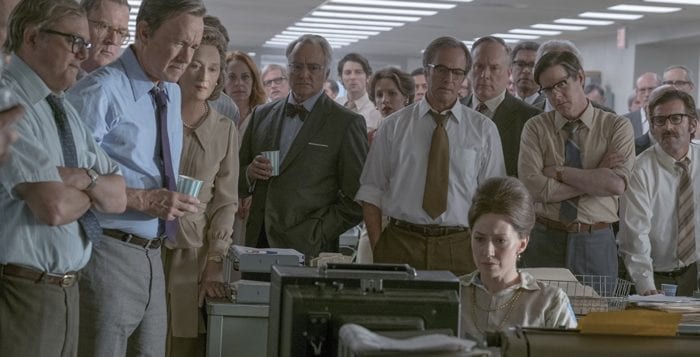By Kevin Redding
Like a reporter punching away at keys to hit a deadline, “The Post” is fast paced, reflective and inspired in its depiction of the most pivotal moment in American journalism: In the summer of 1971, the Washington Post risked it all to publish the Pentagon Papers, a decision that exposed the lies of political leaders surrounding the Vietnam War and firmly protected the First Amendment against suppression by the occupant of the White House.
Carried by a terrific ensemble of seasoned actors and actresses — including Meryl Streep, Tom Hanks, Bradley Whitford, Bob Odenkirk and Sarah Paulson — this docudrama is an incredibly entertaining, pulse-pounding and extremely timely work by a legendary filmmaker who proves he’s still at the top of his game.

In the beginning of 2017, Steven Spielberg was antsy. Antsy because he was sitting around in postproduction limbo, waiting for the special effects to be assembled on his upcoming blockbuster, “Ready Player One.” Antsy to get back behind the camera and do what he does best. And perhaps a little antsy in observance of the state of America around him, in which the president of the United States wages war on the media on a day-to-day basis via Twitter and continually discards foolproof facts as “fake news.”
Enter “The Post,” a film whose screenplay Spielberg read in February, began shooting in May and released nationwide in late December. “When I read the first draft of the script [written by newcomer Liz Hannah], this wasn’t something that could wait three years or two years,” Spielberg said in an interview with USA Today. “This was a story I felt we needed to tell today.”
A fitting entry in Spielberg’s recent arsenal of films celebrating “American values” (“Lincoln,” “Bridge of Spies”), “The Post” is certainly not subtle in its intentions as a reflection of today’s climate, championing the merits of the press and villainizing leaders who wish to stamp it out. This is all done through the masterful vision of Spielberg, who moves the camera like no other director, knowing exactly when to hold on a moment and when to deliver a visual treat for the audience.
The Washington Post reporters in the film — seen schmoozing in cigarette smoke-filled newsrooms, racing to track down sources, and click-clacking away on typewriters in an effort to make the public aware that their leaders knew the war in Vietnam was a losing battle for decades, yet continued to let young soldiers die mostly to avoid the humiliation of an American defeat — are the heroes, “the small rebellion,” as Odenkirk’s Ben Bagdikian calls them.
Meanwhile, President Richard Nixon is portrayed only as a dark silhouette in a voyeuristic shot through the windows of the White House as he barks into a phone to administration officials that “The press is the enemy” and must be silenced with an injunction. He also asserts that no reporter from the Washington Post is ever to be allowed in the White House.
As stated in the movie by Ben Bradlee (Hanks), the famously tough, feather-ruffling editor of the Post: “We have to be the check on their power. We don’t hold them accountable, my God, who will?”
The heart and soul of the movie lies with the working relationship between Bradlee and Katharine Graham (Streep), the Post’s publisher who inherits her family’s newspaper after her husband — Philip Graham, publisher since 1946, who succeeded Katharine’s father — dies, catapulting her into a position neither she nor anybody else ever expected her to fill. Throughout the course of the film, Graham finds her voice and becomes a leader in the male-dominated business, a journey that’s handled beautifully and satisfyingly. And, like everything else, hits a poignant note in modern times.
After The New York Times receives and publishes several top-secret pages of the Pentagon Papers, the Nixon administration hits it with a lawsuit, prompting the courts to rule that the Times cannot publish any more of the documents or any of its findings.
Not one to be outdone by the New York Times, Bradlee encourages his assistant editor, Bagdikian, to chase down the Times’ source for the leak, who delivers to the Post a total 7,000 pages of the documents. In an especially thrilling scene, Bradlee hosts a small team of reporters in his living room to sift through and make sense of the piles of papers, all while his wife (Paulson) serves sandwiches, his daughter sells lemonade, and a pack of lawyers and newspaper investors balk at their plan to undermine Nixon’s authority and publish them, fearing it will result in the paper’s demise.
Graham must decide whether or not to allow the documents to be published. By doing so, she risks the legacy of her family’s newspaper and also the friendships she has with many Washington, D.C., players, including Robert McNamara, secretary of defense under President Lyndon Johnson, who is largely involved in the deception of the American public. Although we, the audience, know the outcome of the film’s events, it’s great fun to watch it unfold, and it doesn’t hurt that it’s a history lesson presented by some of the finest actors, and the greatest director, that ever lived. It’s an incredibly human and powerful story that serves as a great reminder that the voices of the governed should always be louder than those of the governors.
Rated PG-13 for “salty language,” “The Post is now playing in local theaters.





